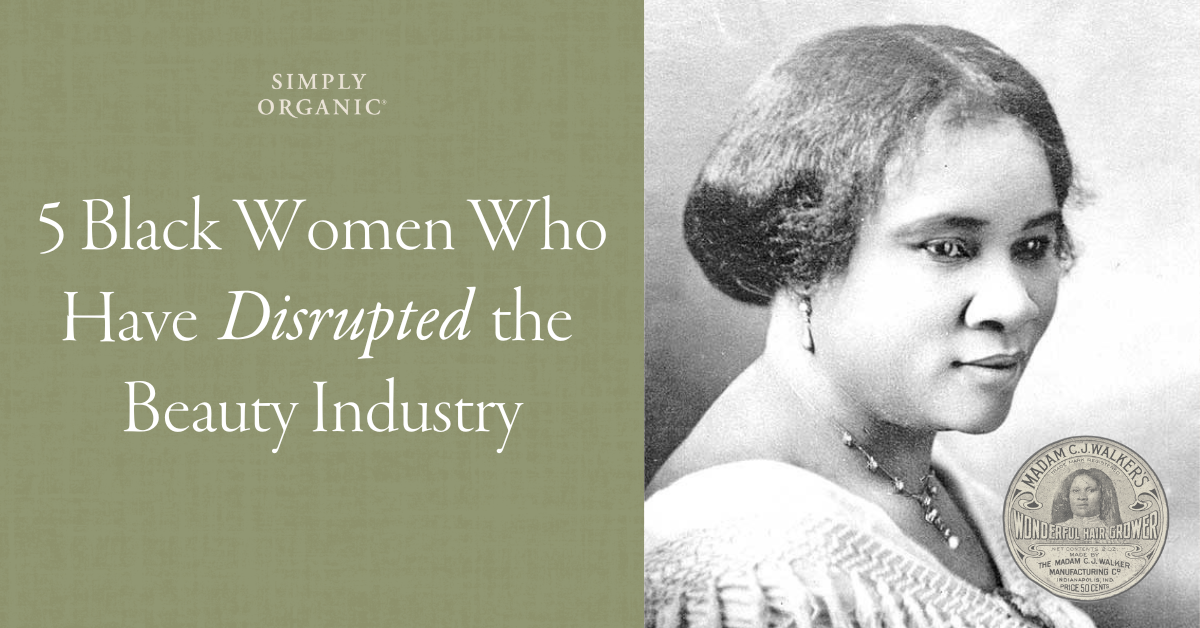
When it comes to the beauty industry, representation and inclusion are vital, but haven’t always been considered as such. Throughout history, there have been countless Black women who have transformed and progressed the beauty industry, making way for modern beauty titans. To celebrate Black History Month, we want to highlight 5 Black women who have disrupted the beauty industry.
Madame C.J. Walker
Known as the “first Black woman millionaire in America,” Madame C.J. Walker was one of the first pioneers of the American beauty industry. She first created her haircare products when she experienced a scalp disorder that caused her to lose her hair. The “Walker System,” a method of using lotions and iron combs, was her solution.
Her knowledge, experience, and proven product earned her a cult following. As her business grew, she began to employ saleswomen she referred to as “beauty culturalists” to further her reach to Black women across the country.
Madame Walker’s heart for her community went beyond creating products and jobs for fellow Black women. She donated large portions of her wealth to educational and community-based programs, including the NAACP, the Black YMCA, and the Tuskegee Institute. She even encouraged her employees to give back to their community, providing them with bonuses when they did.
It’s safe to say that Madame C.J. Walker’s contributions to the American beauty industry and the Black community as a whole have firmly cemented her spot in history as a beauty trailblazer.
Rose Morgan
A fixture of 1940s Harlem and a “Pioneer of Hairdressing”, Rose Meta Morgan’s business acumen has been present since she was 10 years old. Inspired by her business-minded father, she started out selling crepe flowers door-to-door with her friends. However, her love of hair won out and she dropped out of high school to pursue a full-time career as a beautician, which included attending cosmetology school.
She soon made her way to New York where she rented a booth at a salon in Sugar Hill, an area of Upper Manhattan where many wealthy and famous Black people congregated. News of her styling skills spread which enabled her to open her own salon, Rose Meta House of Beauty, which amassed over $3 million dollars in its first few years. By 1945 she had a full staff of 29, including 20 hairstylists, three licensed masseurs, and a registered nurse.
Morgan holds a strong belief that there is beauty in everyone, opposing the negative view of “kinky hair”. She opened and expanded Rose Morgan’s House of Beauty, a salon that included a dressmaking department, a wig salon, and a charm school. During her time as owner and operator of her salon establishments, Morgan employed and trained over 3,000 people, retiring in the 1970s.
Pat McGrath
As a young person growing up in 1980s London, Pat McGrath drew inspiration from many sources when it came to her signature experimental makeup and styling. Her mother Jean encouraged her to experiment with makeup and fashion early in her life.
Though she never had formal training, McGrath’s friendship and collaboration with stylist Edward Enninful would prove to be the jumpstart she needed, landing her a job as beauty director at i-D Magazine. In 1999, Giorgia Armani hired her to craft a line of cosmetics and in 2004 she became the Global Cosmetics Creative Design Director for Procter & Gamble.
McGrath has received numerous awards for her artistry, leading her to create Pat McGrath Labs, her own cosmetic company, which became a $1 billion company by 2019. Her iconic avant-garde style and limitless imagination has been employed by everyone from world-famous performers like Rihanna and Taylor Swift, to renowned publications like British Vogue.
Lisa Price
Unlike some of the other women we’ve discussed, Lisa Price’s turn toward the beauty industry happened stemmed from a creative outlet and did turn into a full-time career until her 30s. As a hobby, Price would create her own fragrances and creams in her Brooklyn Kitchen, learning the healing properties of her ingredients along the way.
It was encouragement from her mother, Carol, that lead her to start selling foundational products of Carol’s Daughter to the public. Word-of-mouth and loyal celebrity clients like Halle Berry and Erykah Badu led to her company’s astronomical growth. Carol’s Daughter is one of the first African-American-owned product lines with a flagship store in 2000 and one of the first companies to sell directly to customers via the internet.
In 2014, the brand was acquired by L’Oréal, increasing its accessibility and customer base and providing the needed backing to expand the product line to include body and skincare. Price has received awards for her skills and knowledge and continues to oversee product development and brand management for Carol’s Daughter.
Tracee Ellis Ross
Most well-known as an award-winning actress and daughter of famed performer Diana Ross, Tracee Ellis Ross harnessed the triumphs and struggles of her personal haircare journey to influence her own company, Pattern Beauty.
“As a child, I loved my hair; I had a big mane of hair that mirrored my mother’s, and it connected me to the tribe of my family,” she said in an interview with the Glossy Beauty Podcast. Like many young Black girls, she didn’t see her own hair texture reflected in the media, leading to a “contentious relationship” with her hair. After many years and a hard-earned journey, Ross learned to embrace her natural curl pattern, but noticed there were few products designed for her. This led to the creation of Pattern Beauty.
“The mission of the brand is to meet the needs of the curly, coily and tight texture community,” Ross said. Her ideal brand, one that would embrace the “authenticity” of Black hair, was 10 years in the making, exclusively launching with Ulta Beauty in 2019. She has been instrumental in expanding Ulta’s diversity and inclusion efforts and advocating for the haircare needs of Black men and women.




